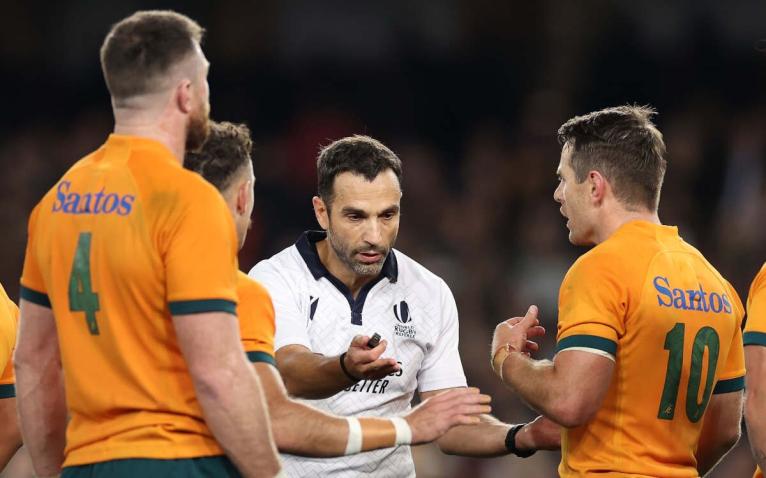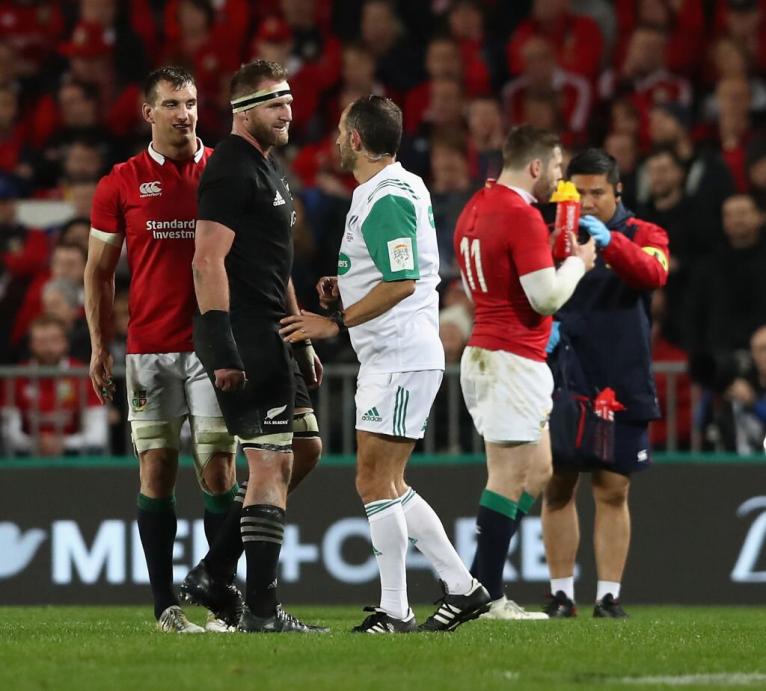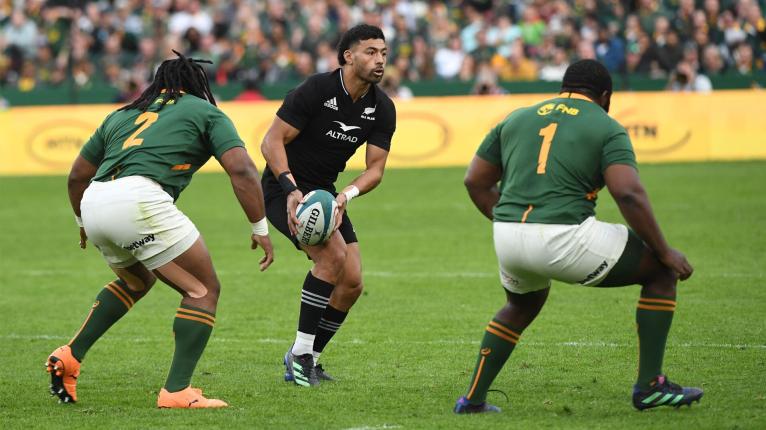The All Blacks have had enough bad luck with French referees but if they win next year’s World Cup, they may have Mathieu Raynal to partly thank for it.
The French official has cast himself as a divisive force in the world game after his unprecedented decision to penalise Wallabies fly-half Bernard Foley for time-wasting in the first Bledisloe Cup clash of 2022.
As is now surely known globally, Raynal’s decision gave the All Blacks a scrum, from which they were able to score a try with the last play of the game and dramatically win the test 39-37.
The Australians, and so it seems the rest of the world, were outraged that Raynal did what he did – saying it was outside the spirit of the game, was cruelly timed and a classic case of a referee wrongly determining the outcome a big test.
In New Zealand, the decision was welcomed and not just because it was the lifeline the All Blacks needed to escape from Melbourne with a victory.

It was a decision much bigger than that. New Zealanders are hoping it was the first definitive act to spark a global clampdown on time wasting in international rugby ahead of next year’s World Cup.
Time wasting has become the scourge of the international game – and not the sort of blatant, obvious run the clock down measure we saw from Foley in Melbourne.
The real issue is the subtle time-wasting that has become part and parcel of the international scene: the way teams huddle 30 metres from a lineout and then slowly walk to get there, often killing a full minute or longer between the ball going out and the game re-starting.
Then there is the way that some teams, if they have been forced into a prolonged aerobic blast, send a big prop to his knees, where he demands medical attention before he can carry on.
Those feigned injuries don’t wind the clock down as such because the referee will stop time for injuries, but they are a great way for players to suck in some oxygen, recover and reset with their heart rates lower.
And then there is the whole business of setting scrums. The referee calls the scrum and a good 10 to 20 seconds can pass by with neither side remotely trying to get organised.
The All Blacks, rightly or wrongly, feel they have been the victims of this global slowdown.
Then they slowly form and who knows, it might all work the first time, but the statistics no doubt show that at least half the time there needs to be a reset and if a team really needs to kill three minutes, it’s frighteningly easy to do so by mucking about at the scrum.
The All Blacks, rightly or wrongly, feel they have been the victims of this global slowdown. In fact, they would go further and say that after the British and Irish Lions came to New Zealand in 2017 and drew the series on the back of some expert defence, clever time-wasting and masterful cynicism, the rest of the world had its blueprint to derail the free-flowing New Zealand pass and catch running approach.
The Lions did play some great rugby in that series, but so too did they ensure that the game was operating at a glacial pace – that every second they could milk for themselves, they did, and any way they could avoid fatigue entering the contest, they took.
And that’s been the All Blacks’ gripe for the last five years: they have seen their opposition become ever more adept at managing the clock, of slowing things down during stoppages and brilliantly nullifying the conditioning advantages the All Blacks want to exploit.
It’s not as paranoid or as conspiratorial as it sounds either. If we look at results and trends in world rugby since late 2017, the All Blacks have become more vulnerable and the game more defensive and conservative, with many teams still building their attack on the rolling maul, box kicks and a strong scrum.

It’s not just that the All Blacks became more vulnerable, they were quite often beaten up physically by bigger, more powerful athletes. Some of that was due to poor coaching in New Zealand, particularly post 2019, but it’s also because the All Blacks have built hybrid athletes who are physical yet aerobic and they need the game to flow and for fatigue to be a factor.
If Tests can be dominated by box kicks and trudge from one set-piece to the next and the stoppages elongated, it plays directly into the hands of the likes of South Africa, England and Argentina who have built bigger, more powerful, anaerobic athletes.
The All Blacks want World Rugby to do more to speed things up: to encourage referees to penalise teams who drag themselves to the lineout and to chase away water carriers and medics when they suspect there is no real injury for them to attend to.
As All Blacks coach Ian Foster said after the great escape in Melbourne: “There was a lot building up into that particular period – there were a number of delays and things.
“Ultimately I think the debate is at two levels. The first debate is time-wasting in a game, and I think that’s worthy of a separate conversation.
What Raynal has done is elevate the debate and create discussion about a topic that the All Blacks want to be talked about within the halls of power.
“We’ve been trying to drive that message all year, to be fair, with how teams slow things down. When it comes back to how can you speed the game up, we’re certainly in on that debate.
“With the scrum resets, they are making moves to do that. There’s clearly delays in teams going to lineouts and maybe that’s another area where we could improve as a game.
“Overall, I think there’s a whole lot of little areas where things can change, but I just don’t really believe that the last decision is tied to that debate.”
What Raynal has done is elevate the debate and create discussion about a topic that the All Blacks want to be talked about within the halls of power.
The evidence to believe they are being punished by time wasters has been seen all year. South Africa played at a snail’s pace when they beat the All Blacks in Mbombela. The pauses were frequent and the stoppages were too long. South Africa managed the clock brilliantly and trudged around, wasting minutes however they could to play at their pace.
A week later at Ellis Park and the All Blacks, through better skill execution, were able to put passages of play together that stressed the Boks and left them huffing and puffing and also, the referee hurried them along a little bit better.

The final 10 minutes saw the All Blacks blast past the Boks because they were fitter and built to play for 80 fast minutes rather than 80 slow ones.
In Christchurch, the Pumas pushed the boundaries on time-wasting. They tested everyone’s patience with their feigned injuries, long planning huddles and slow, slow pace. And they won.
A week later, the All Blacks again produced a fast start and got some aerobic content into the game and the Pumas attempts at slowing things down where nowhere near as effective and they were hammered 53-3.
There is just no doubt that the All Blacks chances of winning the World Cup will be greatly increased if World Rugby decides that the game is suffering as an entertainment product due to the abundance of time wasting and cynicism.
The ball just isn’t in play for long enough and it’s not feasible to keep stopping the clock every time it goes out because the typical match would then stretch way beyond two hours and broadcasters won’t like it and won’t pay the historic values that they have to own it.
The All Blacks are not the lone voice in calling for World Rugby to act.
And the World Cup is World Rugby’s jewel in the crown: that’s the place, surely, where they want new fans to see a fast-flowing, aerobic game that zips along without long and unexplained periods where nothing happens?
The truly interesting thing in all this is that the All Blacks are not the lone voice in calling for World Rugby to act.
England’s coach Eddie Jones has said he finds the whole business of time wasting a disappointing component that has been allowed to flourish and he too hopes something will be done about it.
“It’s a poor part of our game,” he said recently. “There’s not enough ball in play or fatigue in the game, and there are too many stoppages. Anything referees can do to speed up the recommencement of play, the better it is.”
The old saying in New Zealand is that a fast game is a good game and it is one that World Rugby is going to have to seriously consider.


As an example, in ice hockey, which is played for 60 minutes "stop time", that is, every time the whistle blows, the clock STOPS, and doesn't start again until the puck is dropped in the following face-off, there are STILL provisions for "delay of game" penalties. There are several reasons one of these can be called by the referee, but the main one is if someone shoots the puck over the glass, even accidentally. Another one is taking too much time with line changes before a face-off. (Huddles at lineouts anybody?) One of these at a crucial time in a game can really cost the offending team, in fact games have swung on it. Some of these in rugby would certainly help, and thanks to Foley, it WAS crucial, and the game swung on it! (Good on ya, Mister Raynal!) But the ones that REALLY annoy me are the faked injury, we-need-a-breather-against-this-rampaging-black-horde ones! I don't remember an All Black ever going down with a faked injury, in fact they're more likely to jump up to show they're NOT injured, in case the coach pulls them off! To those teams that pull this crap all the time (Boks are the worst offenders), I say "Supposedly injured?? The Hell with him - get him off or bury him there!!"
Great insight Gregor. Restarts in our game promote innovation whether from lineouts, (loving the quick throw to the front being seen in the Bunnings NPC) or scrums or even tap penalties (so much opportunity here close to the line) yet to your point, teams do search for that formulaic boring and predictable line-out rolling maul with the time wasted to execute these crucial to an attacking teams success.
Coaches/coaching are key to the speeding up of the contest in my eyes and the best way to promote that is through World Rugby re-incentivising tries scored from tap penalties/free kicks (worth 4), rolling mauls (decrease to 3) and also from ‘where’ on the pitch a try commenced. Length of field tries or tries from your own half awarded 7 points and tries scored from in the attacking half stick with the 5 points.
O’night over a few whiskeys and strokes of some old quills in a Dublin boardroom our game will transform spectacularly into the entertainment spectacle it should be as pictures of time and space to attack will explode coaches minds.
The average weight of the South African team is 1.5kgs less than New Zealand. It seems South Africans are stronger and like the physical side of the game a bit more.
Then why do they like wasting time and playing the game at a snail's pace?? Gregor is right - the "injury" stoppages, and the plodding to the scrums and lineouts in Mbombela were disgusting! They looked like their feet were made of lead! The Pumas did the same here in Christchurch, and Foley has nobody but himself to blame - he was just effing around, and would have run the clock right out if he could have! It's high time the refs clamped down on this, and clamped down hard! It wouldn't be tolerated in any other game, why should it be tolerated in rugby?
when I watch a rugby match on delayed and advance the "time-outs", I find that actual game (ie when the clock is ticking) does not reach 40 minutes. too much time is wasted reseting scrums and lineouts over and over again.
Wouldn’t it be great if it happens, but the pessimist in me can’t see it happening.